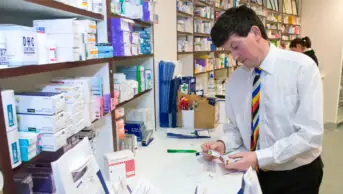
Shutterstock.com
The General Pharmaceutical Council (GPhC) has released new guidance on the ‘duty of candour’ that it expects from pharmacy professionals, including when patients deserve a “meaningful” apology.
The ‘Pharmacy team toolkit: learning from incidents‘, published on 22 June 2022, says: “Saying sorry meaningfully when things go wrong is vital for everyone involved in an incident.”
It adds that this includes “explaining what happened, what has been done or can be done to put matters right and what will be done to stop the same thing happening to someone else”.
The guidance, which was developed jointly with the National Pharmacy Association (NPA) and the Pharmacists’ Defence Association, also advises that saying sorry is not the same thing as admitting legal liability for an incident and that it does not expect pharmacy staff to take personal responsibility for something that was not their fault.
However, it added that an apology was an acknowledgement that something could have gone better and that it could help to improve learning and patient safety.
In October 2014, in response to the Francis Inquiry Report into failings in care at Mid Staffordshire NHS Foundation Trust, the GPhC was one of a number of healthcare regulators that published a statement committing to making candour an essential duty for all healthcare professionals.
The new guidance is aimed to bring this statement to life and provides more detail on what the duty of candour means in practice, with real-life case examples of when pharmacy teams have learned from incidents.
“The duty of candour is not an add on – it’s a fundamental part of pharmacy professional practice,” the guidance says.
It also points out that, if an incident leads to a fitness to practise investigation, investigating committees see candid explanations, expressions of empathy and apologies as “positive steps”.
“These will not normally amount to an admission of impairment by the pharmacist or pharmacy technician involved.”
The guidance also says that committees will take very seriously “a finding that a pharmacist or pharmacy technician took deliberate steps to avoid being candid with a patient, or with anyone involved in a patient’s care, or to prevent someone else from being candid”.
Gisela Abbam, chair of the GPhC, said: “We know that pharmacy professionals are working in multi-disciplinary teams and taking on new clinical roles, and it’s important that they demonstrate the duty of candour in an increasing variety of complex situations.”
Jasmine Shah, head of advice and support services for the NPA, said: “We are striving to move away from a blame culture towards a learning culture. It is important to acknowledge when something goes wrong and to help the patient understand what happened.“


